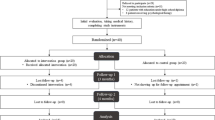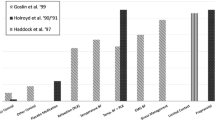Abstract
Behavioral treatments (relaxation, biofeedback, cognitivebehavioral therapy) have been empirically validated for migraine and tension-type headaches, with recent metaanalyses yielding 37% to 50% reductions in tension-type headache, comparing favorably with 33% reduction from medication prophylaxis (amitriptyline). Research has moved toward increasing availability and cost effectiveness through alternative delivery formats and combining and comparing them with standard medications. Further modifications would make standard behavioral treatments available and conducive to primary care settings where most patients receive treatment. Beyond the current behavioral and drug treatments, we propose a fundamental shift in conceptualization and treatment for headache.
Similar content being viewed by others
References and Recommended Reading
Silberstein SD, Lipton RB: Chronic daily headache, including transformed migraine, chronic tension-type headache, and medication overuse. In Wolff’s Headache and Other Head Pain, edn 7. Edited by Silberstein SD, Lipton RB, Dalessio DJ. New York: Oxford University Press; 2001:247–284.
Ashina S, Ahsina M: Current and potential future drug therapies for tension-type headache. Curr Pain Headache Rep 2003, 7:466–474.
Bodenheimer T, Lorig K, Holman H, Grumbach K: Patient self-management of chronic disease in primary care. JAMA 2002, 288:2469–2475. This paper discusses deficits in the primary care treatment for chronic disease and the need for integration of self-management in the primary care setting. Authors contrast self-management with traditional care and patient education and discuss successful applications of self-management with arthritis and asthma.
Creer TL, Holroyd KA: Self-management. In Cambridge Handbook of Psychology, Health, and Medicine. Edited by Baum A, Newman S, Weinman J, et al. Cambridge: Cambridge University Press; 1997:255–258.
Andrasik F: Behavioral treatment approaches to chronic headache. Neurol Sci 2003, 24(suppl 2):S80-S85.
Holroyd KA: Behavioral and psychologic aspects of the pathophysiology and management of tension-type headache. Curr Pain Headache Rep 2002, 6:401–407.
Holroyd KA, Penzien DB, Lipchik GL. Behavioral management of headache. In Wolff’s Headache and Other Head Pain, edn 7. Edited by Silberstein SD, Lipton RB, Dalessio DJ. New York: Oxford University Press; 2001:562–598.
Penzien DB, Rains JC, Andrasik F: Behavioral management of recurrent headache: three decades of experience and empiricism. Appl Psychophysiol Biofeedback 2002, 27:163–181. This paper provides the most comprehensive overview of the behavioral treatments for tension-type and migraine headache, including clinic and alternative treatment formats.
Bogaards MC, ter Kuile MM: Treatment of recurrent tension headache: a meta-analytic review. Clin J Pain 1994, 10:174–190.
Holroyd KA, Penzien DB: Client variables and the behavioral treatment of recurrent tension headache: a meta-analytic review. J Behav Med 1986, 9:515–536.
McCrory DC, Penzien DB, Hasselblad V, Gray RN: Evidence Report: Behavioral and Physical Treatments for Tension-type and Cervicogenic Headache. Des Moines, IA: Foundation for Chiropractic Education and Research (Product No. 2085); 2001. This report details findings of the most rigorous meta-analysis of behavioral treatments for tension-type headache.
Blanchard EB: Psychological treatment of benign headache disorders. J Consult Clin Psychol 1992, 60:537–551.
Blanchard EB, Appelbaum KA, Guarnieri P, et al.: Five-year prospective follow-up on the treatment of chronic headache with biofeedback and/or relaxation. Headache 1997, 27:580–583.
Holroyd KA, O’Donnell FJ, Stensland M, et al.: Management of chronic tension-type headache with tricyclic antidepressant medication, stress management therapy, and their combination: a randomized, controlled trial. JAMA 2001, 285:2208–2215. This research is one of the few and probably best to compare the independent and combined effects of behavioral and medication treatment for tension-type headache.
Haddock CK, Rowan AB, Andrasik F, et al.: Home-based behavioral treatments for chronic benign headache: a metaanalysis of controlled trials. Cephalalgia 1996, 17:113–118.
Penzien DB, Rains JC, Holroyd KA: A review of alternative behavioral treatments for headache. Miss Psychol 1992, 17:8–9.
Rowan AB, Andrasik F: Efficacy and cost-effectiveness of minimal therapist contact treatments for chronic headache: a review. Behav Ther 1996, 27:207–234.
Napier DA, Miller CM, Andrasik F: Group treatment for recurrent headache. Adv Med Psychother 1987, 9:21–31.
deBruin-Kofman AT, van de Wiel H, Groenman NH: Effects of a mass media behavioral treatment for chronic headache: a pilot study. Headache 1997, 37:415–420.
Strom L, Peterson R, Andersson G: A controlled trial of self-help treatment of recurrent headache conducted via the Internet. JCCP 2000, 68:722–727.
Lipton RB, Silberstein SD, Saper JR, et al.: Why headache treatment fails. Neurology 2003, 60:1064–1070. This is a thought-provoking paper that provides helpful insights regarding the myriad of reasons headache patients often receive less than optimal care.
Penzien DB, Gabb MG: Non-pharmacologic prevention and treatment of recurrent headache. Adv Stud Med 2003, 3:S168-S174.
Rasmussen BK: Migraine and tension-type headache in a general population: precipitating factors, female hormones, sleep pattern, and relation to lifestyle. Pain 1993, 53:65–72.
Beck AT, Rush AJ, Shaw BF, Emery G: Cognitive Therapy of Depression. New York: Guilford Press; 1979.
Greenberger D, Padesky CA: Mind over Mood: A Cognitive Therapy Manual for Clients. New York: Guilford Press; 1995.
Holroyd KA, Stensland M, Lipchik G, et al.: Psychosocial correlates and impact of chronic tension-type headaches. Headache 2000, 40:3–16.
DeBenedittis G, Lorenzetti A: Minor stressful life events (daily hassles) in chronic primary headache: relationship with MMPI personality patterns. Headache 1992, 32:330–334.
Srikiathachorn A, Phanthumchinda KP: Prevalence and clinical features of chronic daily headache in a headache clinic. Headache 1997, 37:277–290.
Edhe DM, Holm JE. Stress and headache: comparisons of migraine, tension, and headache-free subjects. Headache Q 1992, 3:54–60.
Holm JE, Holroyd KA, Hursey KG, Penzien DB: The role of stress in recurrent tension headache. Headache 1986, 26:160–167.
Houle TT, Rains JC, Penzien DB, et al.: Biobehavioral precipitants of headache: time-series analysis of stress and sleep on headache activity. Headache 2004, 44:533–534.
Mosley TH, Penzien DB, Johnson CA: Time-series analysis of stress and headache. Cephalalgia 1991, 11(suppl 11):306–307.
Rains JC, Poceta SJ: Sleep-related headache syndromes. In Seminars in Neurology on Sleep. Edited by Avidan AY. New York: Thieme Publishing; 2004, in press.
Edinger JD, Wohlgemuth WK, Radtke RA, et al.: Cognitive behavior therapy for treatment of chronic primary insomnia. JAMA 2001, 285:1856–1864.
Rains JC, Penzien DB: Chronic headache and sleep disturbance. Curr Pain Headache Rep 2002, 6:498–504.
Rapoport A, Stang P, Gutterman DL, et al.: Analgesic rebound headache in clinical practice: data from a physician survey. Headache 1996, 36:14–19.
Spierings El, Ranke AH, Honkoop PC: Precipitating and aggravating factors of migraine versus tension-type headache. Headache 2001, 41:554–558.
Lipchik GL, Penzien DB: Psychiatric comorbidities in patients with headache. In Seminars in Pain Medicine: Headache. Edited by Backonja HM. Philadelphia: Elsevier Ltd; 2004:93–105.
Guidetti V, Galli F, Fabrizi P, et al.: Headache and psychiatric comorbidity: clinical aspects and outcome in an 8-year follow-up study. Cephalalgia 1998, 18:455–462.
Puca F, Genco S, Prudenzan MP, et al.: Psychiatric comorbidity and psychosocial stress in patients with tension-type headache from headache centers in Italy. The Italian Collaborative Group for the Study of Psychopathological Factors in Primary Headaches. Cephalalgia 1999, 19:159–164.
Haynes RB, McDonald HP, Garg AX: Helping patients follow prescribed treatment: clinical applications. JAMA 2002, 2880–2883.
Dunbar-Jacob J, Erlen JA, Schlenk EA, et al.: Adherence in chronic disease. Annu Rev Nurs Res 2000, 18:48–90.
Urquhart J: Patient non-compliance with drug regimens: measurement, dclinical correlates, economic impact. Eur Heart J 1996, 17(suppl A):8–15.
Vermeire E, Hearnshaw H, Van Royen P, Denekens J: Patient adherence to treatment: three decades of research. A comprehensive review. J Clin Pharm Ther 2001, 26:331–342.
Dunbar J: Adherence to medical advice: a review. Int J Ment Health 1980, 9:70–87.
Royal Pharmaceutical Society of Great Britain: Working Party from Compliance to Concordance. In Achieving Shared Goals in Medicine Taking. London: Royal Pharmaceutical Society of Great Britain; 1997.
Packard RC, O’Connell P: Medication compliance among headache patients. Headache 1986, 26:416–419.
Mulleners, WM, Whitmarsh TE, Steiner TJ: Noncompliance may render migraine prophylaxis useless, but once-daily regimens are better. Cephalalgia 1998, 18:52–56.
Fitzpatrick RM, Hopkins AP, Harvard-Watts O: Social dimensions of healing: a longitudinal study of outcomes of medical management of headaches. Soc Sci Med 1983, 17:501–510.
Holroyd KA, Cordingley GE, Pingel JD, et al.: Enhancing the effectiveness of abortive therapy: a controlled evaluation of self-management training. Headache 1989, 29:148–153.
Tobin DL, Reynolds RV, Holroyd KA, Creer TL: Self-management and social learning theory. In Self-Management of Chronic Disease: Handbook of Clinical Interventions and Research. Edited by Holroyd KA, Creer TL. Orlando, FL: Academic Press: 1986:29–58.
Holman H, Lorig K: Patient self-management: a key to effectiveness and efficiency in care of chronic disease. Public Health Rep 2004, 119:239–243. Authors draw on successful applications with various chronic conditions to highlight the value of self-management with chronic disease.
The Robert Wood Johnson Foundation: Chronic Care in America: A 21st Century Challenge. San Francisco: The Institute for Health and Aging, University of California; 1996.
Hoffman C, Rice D, Sung HY: Persons with chronic conditions: their prevalence and cost. JAMA 1996, 276:1437–1479.
Hu X, Markson L, Lipton RB, et al.: Disability and economic costs of migraine in the United States: a population-based approach. Arch Intern Med 1999; 159:813–818.
Caplin DL, Creer TL: A self-management program for adult asthma. Part III: maintenance and relapse of skills. J Asthma 2001, 38:343–356.
Maizels M, Saenz V, Wirio J: Impact of a group-based model of disease management for headache. Headache 2003, 43:621–627. This paper reports one of only a few systematic attempts to incorporate self-management techniques with headache and describes outcomes pertaining to the cost of headache care
Harpole LH, Samsa GP, Jurgelski, AE, et al.: Headache management program improves outcome for chronic headache. Headache 2003, 43:715–724. This paper describes one of the few systematic attempts to develop and evaluate self-management for headache.
Blumenfeld A, Tischio M: Center of excellence for headache care: group model at Kaiser Permanente. Headache 2003, 43:431–440.
Lake AE, Saper JR: Comprehensive inpatient treatment for intractable migraine: a prospective, long-term outcome study. Headache 1992, 33:55–62.
Hoodin F, Brines BJ, Lake AE, et al.: Behavioral self-management in an inpatient headache treatment unit: increasing adherence and relationship to changes in affective distress. Headache 2000, 40:377–383.
Mitchell KR, White RG: Behavioral self-management: an application to the problem of migraine headaches. Behav Ther 1977, 8:213–221.
Lahdensuo A: Guided self-management of asthma: how to do it. BMJ 1999, 319:759–760.
Author information
Authors and Affiliations
Rights and permissions
About this article
Cite this article
Penzien, D.B., Rains, J.C., Lipchik, G.L. et al. Behavioral interventions for tension-type headache: Overview of current therapies and recommendation for a self-management model for chronic headache. Current Science Inc 8, 489–499 (2004). https://doi.org/10.1007/s11916-004-0072-2
Issue Date:
DOI: https://doi.org/10.1007/s11916-004-0072-2




